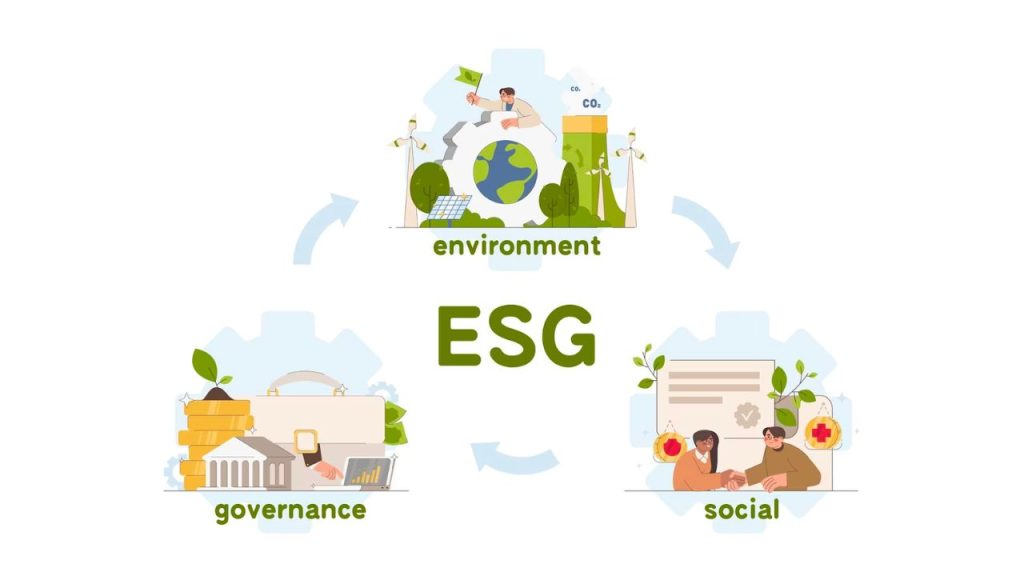Discover the power of ESG – the three fundamental principles driving sustainability, ethics, and social responsibility in today’s investments. Embrace a brighter future and make a positive impact with every investment decision.
But why is ESG important? That’s what we’ll take a look at in this article.
Table of Contents
What is ESG?

ESG stands for Environmental, Social, and Governance, and it encompasses a company’s impact on the environment, society, and how it is governed.
In simpler terms, ESG refers to a corporation’s non-financial aspects and its effect on the world around it.
In the context of sustainability, ESG focuses on assessing a company’s efforts to balance the needs of the present with those of future generations.
It involves evaluating the ways in which a corporation operates, considering factors such as its carbon footprint, labor practices, and corporate governance, among others.
Why is ESG Important Today?
The importance of ESG has never been greater than it is today.
In 2020, the world witnessed an unprecedented number of natural disasters, including record-breaking wildfires, devastating floods, powerful hurricanes, and extreme heatwaves, among others.
These events resulted in devastating losses, both in terms of human lives and financial costs, estimated to be over $140 billion and counting.
Recent studies have also indicated a disturbing increase in methane levels, which contribute to a quarter of the world’s global warming, and a rise in sea levels to their highest point in history.
These developments highlight the urgent need for action to address the unsustainable practices that are causing these changes and putting our planet at risk.
This is where ESG comes into play, as it helps us understand the impact of our actions and makes us more conscious of the choices we make in our daily lives.
ESG provides a framework for creating a more sustainable future and for addressing the challenges we face.
If you want to help make the world a better place, it starts with your own actions, and that includes being mindful of the impact of your investments.
Where Does ESG Come from?
The term ESG, which stands for Environmental, Social, and Governance, was first introduced by the Global Compact in 2004.
However, the idea of taking into account non-financial factors in business dates back much further, with some tracing its beginnings to the launch of the FTSE4Good indices in 2001.
The concept of ESG has gained significant traction in recent years, but sustainable investing is not a novel idea.
The practice of impact investing, which aims to generate not only financial returns but also positive social and environmental impact, has its roots in religious groups who set ethical guidelines for their portfolios, such as avoiding investment in industries such as tobacco, alcohol, and gambling.
How Important is ESG for The Industry?

The significance of ESG in the industry sector cannot be overstated. It is crucial for companies to realize the potential of ESG in establishing sustainable business practices and promoting positive social transformation.
Implementing ESG into their operations has proven to be beneficial for businesses, as it not only reduces costs and minimizes risks but also opens up new opportunities for generating income.
The industry is facing challenges such as climate change, resource depletion, and social disparities, and ESG plays a crucial role in addressing these issues and ensuring the industry’s continued success.
Having a well-planned ESG strategy can make companies more appealing to investors and consumers, thereby positively impacting their financial performance.
The Importance of ESG for Businesses and Investors
The significance of ESG for companies and investors is rooted in risk management and adaptation. ESG encompasses factors that are primarily long-term considerations and carry with them the risks associated with predicting future events. These risks are similar to other business risks in that it is crucial to understand, identify, and manage them.
One of the unique challenges with ESG risks is their unpredictability, particularly with regard to climate change. With the world facing unprecedented changes, there is a need for investors to consider ESG criteria in their investment decisions.
ESG risks can also be costly, as seen with the billions of dollars in damages caused by climate change-related extreme weather events. The cost of adaptation and mitigation is substantial, but the cost of uninsured losses is even greater.
To manage ESG risks, companies can assess the potential impact of climate change on their operations, evaluate workplace culture, and promote diversity, among other measures.
Effective ESG risk management supports sustainable long-term growth by proactively identifying and addressing potential issues. It is also important for investors to assess the overall risk and return of a company.
Why is ESG So Popular?
ESG has gained widespread popularity for several reasons. Firstly, it is viewed as both a financial and ethical obligation to address the needs of people and the environment.
ESG is especially relevant in discussions surrounding climate change and environmental degradation, but its scope extends beyond that to include social concerns such as human rights, labor practices, and corruption.
Investors see ESG as a means of mitigating risks associated with a company’s business activities that may pose environmental, ethical, or social hazards.
By incorporating ESG principles into their investment decisions, they can better protect their financial interests while also promoting positive change.
How to Implement an ESG Strategy?
Implementing an ESG strategy in investing involves following one of the four main approaches:
In practice, most corporate ESG strategies draw elements from these four approaches as each company crafts its ESG strategy to suit its individual strengths, weaknesses, opportunities, challenges, and timeline.
Conclusion
ESG (environmental, social, and governance) is a crucial aspect of the business world today, and its importance cannot be overstated.
The world is facing numerous challenges, such as climate change, resource depletion, and social inequalities, that require a concerted effort to address.
ESG provides a way for companies to take responsibility for their impact on the environment and society, reducing risks and costs while generating new revenue streams.
It is not just a moral obligation but also a financial one, as ESG practices have been shown to positively impact a company’s bottom line.
Additionally, ESG is an important tool for investors in evaluating the long-term sustainability of companies.
By incorporating ESG principles into their investment decisions, investors can better protect their financial interests while promoting positive change. ESG is not just a trend or a passing fad but a fundamental shift in the way businesses and investors approach sustainability and social responsibility.
In a world where consumers are increasingly aware of the impact of their purchasing decisions, ESG offers companies a way to demonstrate their commitment to a better future for all.
By prioritizing ESG, companies can not only improve their financial performance but also make a positive impact on the world.
In summary, ESG is important because it provides a roadmap for sustainable business practices, promotes positive social change, and protects both investors and the planet. It is a critical component of a sustainable future and one that will only become more vital in the years to come.
References:
- What is ESG? Definition and meaning – Market Business News. https://marketbusinessnews.com/financial-glossary/esg-definition-meaning/
- ESG rule: A reason for concern | Opinion | bdtonline.com. https://www.bdtonline.com/opinion/esg-rule-a-reason-for-concern/article_710e90b2-a265-11ed-a70c-e30e1a473d30.html
- ESG investing: everything you need to know about it | Sleek. https://sleek.com/au/resources/esg-investing/
- Problems with ESG: holding companies accountable and faulty assessment …. https://www.coolset.com/academy/problems-with-esg-holding-companies-accountable-and-faulty-assessment-systems

